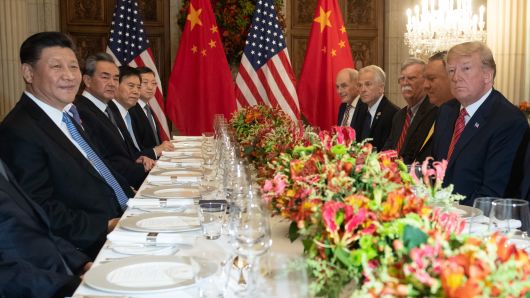
Saul Loeb | AFP | Getty Images
US President Donald Trump (R) US Secretary of State Mike Pompeo (2-R) and members of their delegation hold a dinner meeting with China’s President Xi Jinping (L) Chinas Foreign Affairs Minister Wang Yi (2-L) and Chinese government representatives, at the end of the G20 Leaders’ Summit in Buenos Aires, on December 01, 2018. –
For more than two decades, the U.S. government has been strongly asserting the Chinese military colludes with Chinese corporations to steal intellectual property, spy on U.S. companies, conduct lucrative business with sanctioned entities and actively hack American organizations.
Now, the U.S. government has their first tangible crack at one of those corporations, Huawei, after years of making these types of claims. The stakes couldn’t be higher for the Justice Department to prove them.
On Dec. 1, the U.S. essentially left one of our closest allies — Canada — no choice but to arrest the chief financial officer of one of China’s largest hardware companies, an enterprise that ships more mobile phones than Apple. That CFO, Meng Wanzhou, is the daughter of the company’s founder, injecting a level of interpersonal drama on top of the geopolitics, trade tensions and long-standing allegations against the firm.
As a strictly legal matter, the Huawei case is narrowly focused on payments Iran allegedly made to Huawei in violation of international sanctions, possibly through a third-party intermediary in Hong Kong.
But the case has much broader implications. That’s because the U.S. government has rarely had a chance to make any cyber theft or money-laundering allegations in court against a Chinese executive, particularly an official with the stature of Meng.
Government officials have complained about unfair practices by Chinese corporations mostly before sympathetic Congressional committees, in a friendly conference of like-minded ex-government officials or as anonymous media sources. The Department of Justice has indicted several Chinese citizens under a range of cyber and IP theft allegations, but very few of those have been extradited.
The Huawei case will change that in a huge way. Losing it could mean losing credibility here and abroad on a far wider range of security issues involving China.
The stakes also are high for U.S. corporations, too, including those with nervous executives in China worried about possible legal retaliation in the country, though China has sought to reassure them. U.S. corporate legal issues also hang in the balance: Huawei rival Apple on Monday lost a court ruling against Qualcomm that could keep several of its older phones out of China. (Apple will appeal.)
Huawei has strongly denied allegations levied against the company and Meng, now and throughout the past 10 years.
Huawei’s chief security officer Donald Purdy, a former top cybersecurity official with the Department of Homeland Security, argued earlier this year that U.S. government action the Department of Defense and the Federal Communications Commission was counter-productive.
“Any serious effort to protect U.S. networks will focus not on keeping out individual Chinese companies, but on establishing a comprehensive risk management approach that relies on recognized cyber risk management practices,” he wrote. “America’s real cybersecurity experts understand that the country will be made safer not by selectively banning one or two foreign companies from the U.S. market, but by implementing a comprehensive cybersecurity strategy,” he wrote.
Meng’s bail hearing continues today in Vancouver.
 EU News Digest Latest News & Updates
EU News Digest Latest News & Updates



